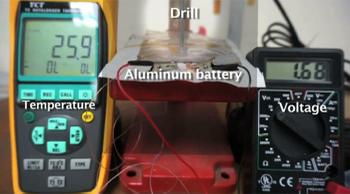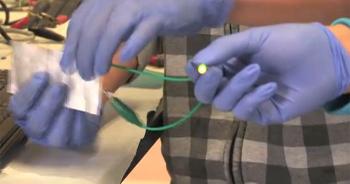Scientists at Stanford University have developed an Aluminium-ion based battery which offers many practical advantages over the popular Lithium-ion cells that are common in our gadgets. The aluminium based batteries are cheaper to make, charge much faster and are safer for users and the environment. The only real drawback with the aluminium designs is that, at this time, they can only deliver about half the voltage of a comparable lithium battery.
Lithium-ion batteries power most of our expensive gadgets and are now more likely than ever to be an important part of many new cars you see on the road. However scientists are beginning to hit barriers in how far they can optimise these Lithium-ion battery cell designs and they often are in the news due to the danger they can cause.
One of the most striking things about the new Aluminium-ion battery is how much safer it seems to be. "Our new battery won't catch fire, even if you drill through it," claims Hongjie Dai, a professor of chemistry at Stanford. Add to this the very flexible nature of the current cell design and it's easy to see the appeal. The ingredients of the battery are a piece of aluminium for the negative anode and a carbon cathode. The electrolyte is "basically a salt that's liquid at room temperature, so it's very safe, said Stanford graduate student Ming Gong, co-lead author of the Nature study. All of these 'ingredients' are held in a flexible polymer coated pouch, as seen below.
The Aluminium-ion battery prototype also boasts the following impressive advantages:
- "Unprecedented charging times" of under a minute
- Able to withstand over 7,500 cycles without any loss of capacity
- Flexibility
- Cheaper, made with abundant, widely available materials
While this battery design has gone leaps and bounds above previous aluminium-based efforts before it, there is one disadvantage right now compared to Lithium batteries – the prototype produced just 2 volts - yet a similar sized Li-ion one could have output 3.6V. The power density on offer is just 40W/Kg, Lithium cells can boast between 100 and 200W/Kg. Prof. Dai says that "improving the cathode material could eventually increase the voltage and energy density". He added that the charging speed, price, flexibility and cycle life makes these Aluminium cells exciting for things such as a grid to store renewable energy.








